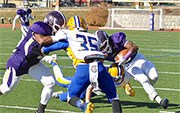- Could Your Grocery Store Meat Be Causing Recurring UTIs?
- Are You Making This Expensive Thermostat Error This Winter?
- Recognizing the Signs of Hypothyroidism
- 10 Strategies to Overcome Insomnia
- Could Artificial Sweeteners Be Aging the Brain Faster?
- Techniques for Soothing Your Nervous System
- Does the Water in Your House Smell Funny? Here’s Why
- Can a Daily Dose of Apple Cider Vinegar Actually Aid Weight Loss?
- 6 Health Beverages That Can Actually Spike Your Blood Sugar
- Treatment Options for Social Anxiety Disorder
High School Football Players Aren’t Well-Educated About Concussion


Despite recent efforts to create awareness about concussion among young athletes, a new study found that high school football players still don’t know enough about the symptoms and consequences of this type of head injury.
More than 300,000 people are treated in emergency rooms every year for brain injuries related to sports, the researchers reported. And, it’s estimated that up to 3.8 million concussions are sustained annually during sporting and recreational events. Half of these injuries involved football, according to the University of Florida researchers.
Yet, fewer than 50 percent of high school athletes are likely to report a concussion, the researchers noted. What’s worse is that around one-quarter of college football players with symptoms of a concussion play anyway, the researchers said.
“Our results showed that high school football players did not have appropriate knowledge of concussion. Even with parents or guardians signing a consent form indicating they discussed concussion awareness with their child, nearly half of the athletes suggested they had not,” study co-author Brady Tripp, from the University of Florida, said in a National Athletic Trainers’ Association news release.
The study was recently published in the Journal of Athletic Training.
The findings are especially worrisome because young athletes are more vulnerable to the effects of a concussion, including post-concussion syndrome (persistent symptoms after a concussion) and second impact syndrome (when the brain swells rapidly and seriously after a repeat concussion), the researchers said.
To address some of these safety issues, the youth sports safety concussion bill was passed in 2012. As a result, the Florida High School Athletic Association implemented a new mandatory concussion consent form that all parents and student athletes are required to sign before participating in a sport. Athletes are also required to report any symptoms of a concussion to an athletic trainer, coach or parent, the researchers explained.
That same year, the researchers surveyed 334 varsity players from 11 Florida high schools. The athletes involved in the study were an average age of roughly 16 and had played about two years of high school football.
The high school football players completed a written questionnaire. They were asked about their knowledge of the symptoms and consequences of concussion. They were also asked how they learned about these injuries.
Most students knew that headache, dizziness and confusion were signs of a concussion. But, many didn’t know that nausea, vomiting, neck pain, grogginess, difficulty concentrating and personality or behavioral changes were also symptoms, the study found.
The researchers noted that only a few of the athletes knew that a concussion could lead to brain hemorrhage, coma and death, if not properly treated.
Many students learned about concussion from their parents, at school or online, the researchers found. But, 25 percent of the athletes said they had no education about concussion at all, according to the study.
The researchers suggested that meetings, instructional videos and online programs could all help educate student athletes. However, the study’s authors added that no matter how much education students receive, athletic directors must not assume students will always self-report if they experience concussion symptoms after sustaining a head injury.
“Athletic trainers and others that make up a school’s sports medicine team should not assume programs available to coaches, parents and athletes will ensure education,” Tripp said. “We recommend they work closely with athletes to reinforce this important information and potentially reduce the incidence of concussion and the acute, chronic or potentially fatal circumstances that can occur.”
More information
The U.S. Centers for Disease Control and Prevention provides information for young athletes on concussion.
Source: HealthDay
Copyright © 2026 HealthDay. All rights reserved.










